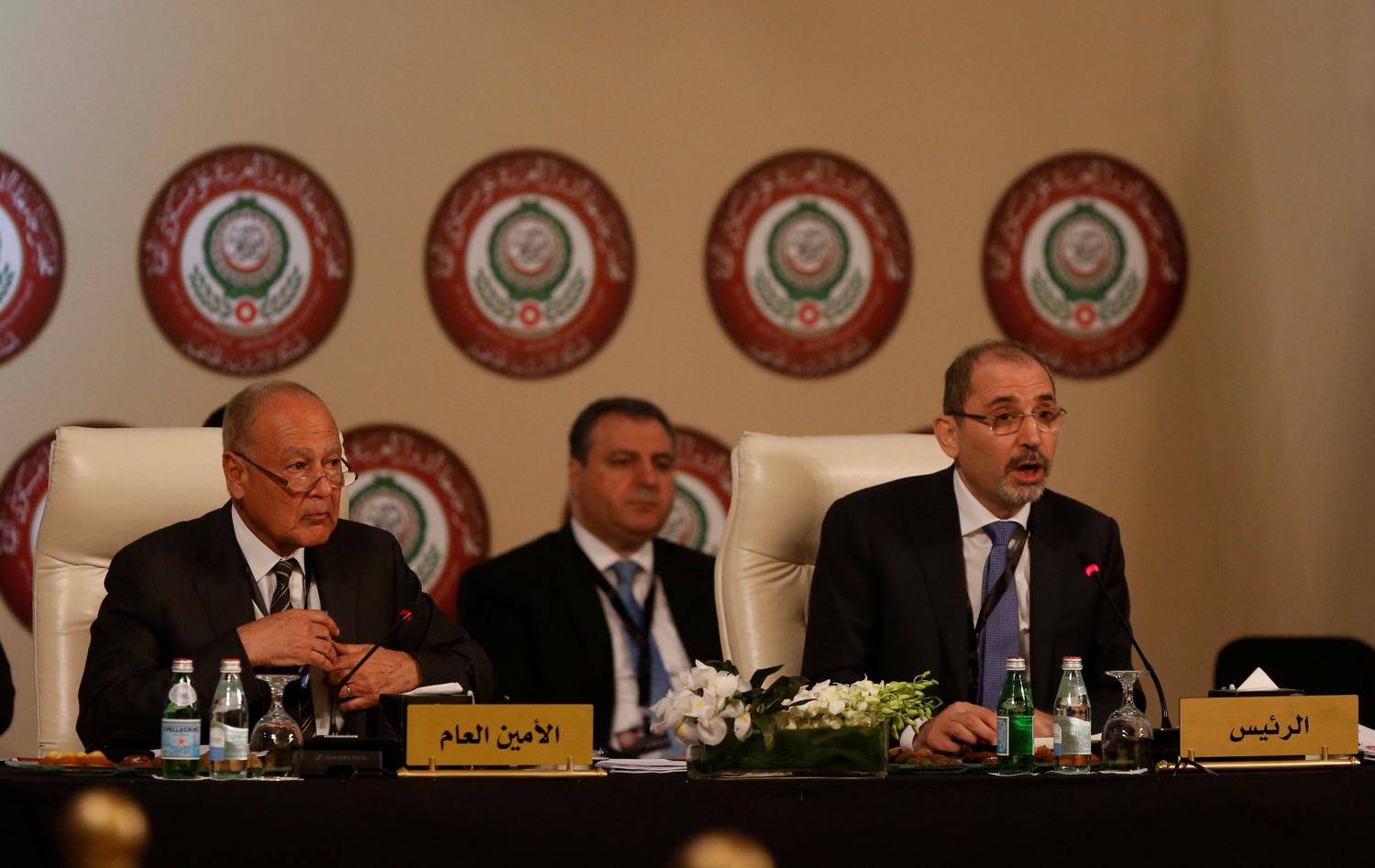If President Bush’s rhetoric on promoting democracy in the Middle East has been bold and ambitious, the implementation of his “forward strategy of freedom” has been rather more tortuous. Diplomatic fights with European allies and harsh critiques from friendly Arab regimes watered down the Broader Middle East and North Africa (BMENA) Initiative, announced at the G-8 summit in June. Bush’s proposal to double funding for the National Endowment for Democracy, the United States’ main tool for democracy promotion abroad, was rejected by the House of Representatives. But while most of the administration’s democracy promotion policy remains at the conceptual level, there is one exception: the Middle East Partnership Initiative, or MEPI. Nearly two years old, MEPI has already spent over $103 million on behalf of educational, economic, and political reform and women’s empowerment in the Middle East.
MEPI was meant as an antidote to America’s traditional focus on government-to-government, large-scale aid programs, and a recognition by the U.S. government that effective reform in economies and society had to be accompanied by increased political freedoms.1 Instead of large projects, MEPI was designed to provide smaller grants to build partnerships with non-governmental Arab groups and local citizens, and to build links across Middle Eastern countries. Inherent in this approach was a judgment that Arab governments had not sufficiently recognized their looming demographic and economic challenges, and had not fully embraced the need for political, economic, and social reform. Instead, the thinking went, they would need to be goaded toward change by a combination of independent American assistance and grassroots activism.
After close to two years of operation, how well is this new democracy-promotion tool meeting its aims? A review of MEPI’s spending, programs, and priorities reveals three troubling flaws: a scatter-shot approach to promoting reform; an overemphasis on government-directed assistance that repeats instead of repairs the errors of our past assistance in the region; and, most worrying, a lack of support at higher policy levels for its goals and projects. MEPI’s problems in fact reveal the deep ambivalence with which the president’s forward strategy of freedom is being implemented. As such, its record raises troubling prospects for democracy promotion as an aim of American policy in the Middle East.
BACKGROUND
MEPI was headed at its inception by then-Deputy Assistant Secretary of State (and vice-presidential daughter) Elizabeth Cheney, giving it high-level political clout within the Administration to back up its muscular focus on a new approach to American democracy assistance. Despite two leadership changes since then (the program is now headed by Scott Carpenter, a political appointee with previous experience in democracy promotion), MEPI has steadily increased its staff and funding, and even opened field offices in two Arab countries (United Arab Emirates and Tunisia) to help advance its agenda of Middle Eastern reform.
Although MEPI was initially allocated only $29 million in reprogrammed FY02 State Department funds, the emergency war-related supplemental appropriation bill, passed in March 2003, increased MEPI’s funding by $100 million. The Bush Administration requested an additional $145 million for the program in FY04, but the House Appropriations Committee reduced the funding to $45 million, citing concerns about duplication of existing aid programs and noting that MEPI was “defined only in the most general terms.” In the FY05 Foreign Operations bill passed by the House this summer, MEPI was granted another $90 million, again less than the administration request (of $150 million), but without the negative committee language. Thus, MEPI has received a total of $264 million, of which it has spent, according to public records, just over $103 million.2
In the 22 months since its founding, MEPI has sought both impact and legitimacy by addressing the reform priorities identified by Arab scholars in the 2002 UN Arab Human Development Report. That report identified four deficits hindering developmental progress in the Arab world: deficits in political freedom, economic freedom, knowledge, and women’s empowerment. MEPI is thus divided into four pillars: economic reform, political reform, educational reform, and women’s empowerment. Each pillar’s goals are outlined in the chart below.
MEPI Pillar Goals and Sample Programs

MISPLACED PRIORITIES
MEPI’s first main flaw is the evident lack of a coherent strategy, which hampers the program’s ability to have a noticeable impact on deeply entrenched social problems and reluctant target governments. In its first nineteen months of operation, MEPI spent its largest share of funds on political reform projects (33 percent or $34,015,000), and the smallest share on women’s empowerment projects (16 percent or $16,981,904). Education reform and economic reform received 25 and 24 percent of MEPI’s funding (or $25,900,000 and $24,626,280), respectively. In principle, this allocation, with political reform most prominent, reflects the president’s stated priorities for Middle Eastern reform. But in practice, the programs funded by MEPI present a scatter-shot approach to reform that does not take account of the political hurdles to economic and social reform and that splits an already-small funding pie into miniscule fragments.
MEPI’s first-year programs run the gamut from the mundane to the visionary. Economic reform grants include funds to translate Algeria’s documentary submissions to the World Trade Organization ($963,000), link Tunisian and American companies for investment ($100,000), train entrepreneurs ($786,575), and boost intraregional trade ($600,000). Education programs include “English in a Box” teaching resources for Jordanian and Moroccan teachers ($400,000), internet links between Yemeni and American high schools ($1.5 million) and a “child centered education program” for selected states in North Africa and the Gulf ($1.1 million). Women’s empowerment programs include projects to teach women to read and advocacy programs to combat honor killings. While these projects individually present worthy opportunities to improve the lives of Arab men, women, and children, the sheer diversity of audiences and issues addressed by these programs means that their impact is likely to be limited in both scope and longevity.
MEPI’s lack of focus seems to result from two distinct forces: first, the pressure on MEPI’s staff to “spend out” their authorized budget in order to justify requests for more funding meant that, especially in the first year, projects did not receive much scrutiny for their fit within an overall strategic plan. Moreover, the desire to demonstrate short-term accomplishments to congressional committees led MEPI to favor small, quick-impact programs, such as one-time training seminars, over those with more potential to produce long-term payoffs. Second, MEPI’s implementation has so far relied heavily on local embassy staff and host governments to recommend programs for potential funding—and that has meant that MEPI’s intent to further policy reforms in Arab states has been blunted by the direction of MEPI funds to “benign” programs favored by host governments, such as girls’ literacy and technical assistance to regime agencies or regime-approved organizations. While MEPI is beginning now to use its field offices and increased staff to build strategic plans, its first two years of funding are not likely to produce significant payoffs in educational, economic or political reform for Arab citizens.
MEPI Total Spending by Fiscal Year

To the extent that any clear trend emerges from MEPI’s record over its first two years, it raises further questions about the program’s approach to promoting democratic reform. While MEPI’s overall funding jumped 287 percent between FY02 and FY03, that increase was not equally distributed across the board. Funding for education pillar programs increased more than five-fold from FY02 to FY03, and economic pillar funding increased threefold. Political reform and women’s empowerment, by contrast, each doubled.
This suggests that MEPI is increasingly shifting its resources from democracy promotion and engagement with local voluntary organizations to the far less provocative path of regime-led economic development. Economic reform is something for which nearly all Arab governments are willing to accept assistance, regardless of the donor, but whether economic change can contribute to the degree of liberalization that the United States sees as necessary to reduce political extremism is uncertain. Arab governments, both oil-rich and not, have long relied on state control over the economic sector as a key means of support for the regime. State-owned industries and bloated government bureaucracies continue to provide much of the local employment, and many large private sector industries rely on government contracting and other favoritism for their survival. For these reasons, many Arab reformers argue that economic liberalization to produce job growth, increase foreign trade, and attract foreign investment cannot succeed without simultaneous and significant political reform. MEPI’s spending trend toward economic reform and away from political and social reform reflects a lack of attention to these cautionary Arab voices, and a willingness by the United States to rely on economic wedges to attempt to advance political liberty.
TOP-DOWN VERSUS BOTTOM-UP REFORM
One of MEPI’s distinguishing features at its founding was its determination to reject large, government-to-government aid programs in favor of direct assistance to Arab civil society groups. But despite MEPI’s intention to encourage the growth and activity of the Arab civic sector, the vast majority, over 70 percent, of MEPI’s first $103 million in grants was distributed to programs that either directly benefited Arab government agencies (in activities ranging from translating documents to computerizing schools) or provided training programs and seminars for Arab government officials (including ministry bureaucrats, parliamentarians, and judges). Only eighteen percent of the allocated funds supported either American or Arab non-governmental organizations working in the region, and five percent went to build the Arab private sector and promote U.S.-Arab business ties. 5.7 percent of the funds were spent on exchange programs, with the only other beneficiary, the U.S. government, receiving just under one half of one percent.3

But the governments’ reform strategies do not fully accord with America’s goals. Most Arab leaders recognize that their stagnant social environments and state-dominated economies cannot meet the expectations of their young and increasingly restless populations. Yet most also seek to reform in ways that improve governmental and economic performance without changing the distribution of political power. While a few forward-leaning regimes have placed limited power in the hands of their peoples through constitutional and electoral reforms, many others are trying to create just enough sense of forward motion and participation without power to alleviate the building public pressure for change at the top. When a government demonstrates a real commitment to improving its responsiveness to citizen needs and its openness to citizen participation, it can be both appropriate and helpful for MEPI to provide government-to-government support. But where this will is absent, weak or feigned, MEPI’s funding can have the effect of subsidizing an Arab government’s attempts to build a kinder, gentler autocracy.
In principle, MEPI was supposed to avoid this trap by finding nascent liberal politicians within civil society, giving them funding and training, and helping them grow their followings so as to secure velvet revolutions. In fact, very little MEPI funding is actually directed to this goal. Of the projects we reviewed, only 10 representing a mere $5.4 million of MEPI’s money, were directed to help local NGOs expand their work in areas such as family law and anti-corruption campaigns. In the key area of political reform, MEPI tends to fund programs carried out by American NGOs that do not cross the red lines of regime-sponsored reform, or that simply do not match the political realities Arabs face. MEPI’s political reform program has trained Morocco’s newly elected members of parliament, whose legislative authority pales in comparison with that of the reigning monarch, in “the functioning of parliament and roles and responsibilities in the legislative process,” to the tune of $600,000. MEPI also conducted a “Gulf Regional Campaign School” to train women political candidates from Gulf countries—but only two Gulf states allow women to run for office at all.
By devoting such a large percentage of its funding to programs benefiting Arab officialdom, MEPI is effectively choosing to support the regimes’ chosen strategy of “controlled liberalization.”4 But in doing so, MEPI undermines its credibility with the already skeptical (and small) group of Arab liberals and civil society activists who are trying to hold their governments accountable for their promises of reform. In the current anti-American environment in the Middle East, any U.S. government program would be hard put to find local allies, and MEPI is no exception. But MEPI’s emphasis on technical assistance to governments has made some Arab activists suspicious that the entire project is a token gesture, a campaign-season gimmick, or, worst of all, a new means of propping up the same regimes who have benefited from direct U.S. assistance in years past. This skepticism about American motives has made Arab liberals reluctant to take the internal political heat they would undoubtedly receive for accepting MEPI funds. Sadly, then, MEPI’s own actions have led very few Arab reformers to take the program seriously as a tool they could use to enhance their efforts—the avowed purpose of the program from its inception.
DOVETAILING DEMOCRACY ASSISTANCE WITH DIPLOMACY
MEPI’s greatest obstacle to effective promotion of democratic reform, however, lies not in its spending patterns but in its continued lack of high-level policy support from senior officials across the Administration. MEPI was deliberately placed within the State Department’s Near East Affairs Bureau, so that MEPI’s reform goals could be more easily integrated into America’s ongoing diplomatic dialogue with Arab states. Sadly, anecdotal evidence suggests that MEPI has difficulty getting talking points about democracy and human rights on the agenda for meetings with senior Arab officials. When Saudi human rights activists were arbitrarily arrested last spring, White House officials passed up the chance to express their concerns in face-to-face meetings. Another recent example is Egyptian President Hosni Mubarak’s March visit to President Bush’s Crawford ranch. Working-level staff on both sides negotiated the two leader’s prepared statements to the press, and included landmark references to reform and democracy. But in their one-on-one meeting, President Bush apparently did not raise the issue of Egyptian political reform at all, fixating instead on Israel’s proposal to withdraw from the Gaza Strip. With Mubarak’s eye on his fifth presidential referendum next year, Bush’s reticence no doubt sent a powerful message.
One North African activist recently told us that American democracy assistance projects such as those MEPI funds propose “to help us be more efficient, to organize. But there is something before this—to have the right to organize.” For MEPI to work effectively, it requires reinforcement—indeed, concerted support—from other arms of America’s foreign policy apparatus. From Congressionally appropriated bilateral assistance to Congressionally mandated sanctions, from state visits to the White House to State Department “shame lists,” the U.S. government has a variety of tools at its disposal to pressure and cajole Arab leaders toward meaningful democratization. So far, the president’s peripatetic, but occasionally inspirational, rhetoric on Middle Eastern democracy has yet to be reflected in the day-to-day conduct of American relations with Arab governments. The heartfelt pro-democracy pleadings of Arab civic activists at a New York forum last month apparently convinced a previously skeptical Colin Powell that democracy promotion was a worthy investment. Now the senior levels of the State Department must follow through on that realization.
CONCLUSION
The Middle East Partnership Initiative has established a new foundation for American assistance to the Arab world, despite bureaucratic obstacles, uncertain annual funding and a heavy legacy of American support for and toleration of autocratic Arab regimes. But in its first year and a half, MEPI has chosen to nibble at the margins of the reform problem by funding a wide variety of uncontroversial programs and largely working within the boundaries set by Arab governments. In order to have a meaningful impact, MEPI must develop a strategy that does the following:
- Tackles the political roots of Arab societies’ economic, educational, and social stagnation;
- Reinforces and builds upon the efforts of grassroots Arab activists to assert citizens’ own role in governance;
- Challenges Arab regimes’ chosen strategy of reform without democratization; and
- Benefits, in a consciously directed fashion, from the willingness of the White House to engage directly with senior Arab officials on democratic reform and its requirements.
MEPI cannot alone compel Arab autocrats to yield power to the elected or quasi-elected institutions they have so grudgingly created. But it is equally true that MEPI’s attempts to prepare candidates, parties, and elected officials for real democratic participation are meaningless unless participation is a real possibility. Without greater clout within the foreign policy bureaucracy, and without synergy between MEPI programs and other policy tools, MEPI will never be able to function as it was intended, as the centerpiece of a coherent U.S. policy for democracy promotion in the Arab world.
The Brookings Institution is committed to quality, independence, and impact.
We are supported by a diverse array of funders. In line with our values and policies, each Brookings publication represents the sole views of its author(s).




